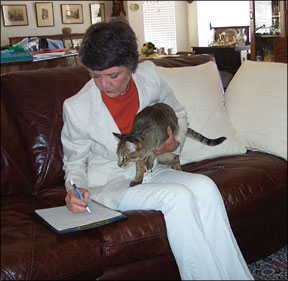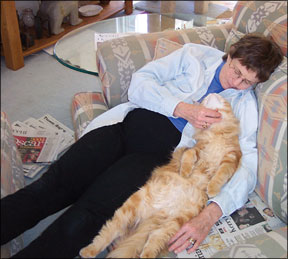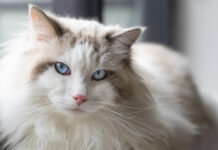288 Whenever Alexandria Brooke, a junior at the University of Massachusetts, would return home from school, she would wake up with hives on her face. She thought it might be the laundry detergent her family used at home or some new cosmetic or soap. Finally, she made an appointment to see her doctor. After the physical exam and standard questions, the doctor asked,” “Does your cat sleep on or around your face?” Alexandria was surprised at the inquiry, but it was true. Her cat Micky slept on her chest, face or neck every night at home. At first, it was annoying but Alexandria got used to it. Apparently, her skin did not. After locking Micky out of her room at night, Brooke began waking up with no skin outbreaks and even less nasal congestion. But all was not well. Micky yowled outside Alexandrias door when she was prohibited from entering. Perhaps you too have an overly-affectionate feline who drives you a bit crazy by hopping on your lap whenever you sit down, insists on sleeping with you even though you cant take it, doesnt let you talk on the phone or crawls onto your Sunday paper. How can you keep your loving cat from loving too much to the point of annoyance or discomfort? Cats and Affection Cats
Most cats and their human companions have similar needs for affection. Both enjoy being approached for petting or a cuddle. On the other hand, some companions complain that their cats are too standoffish, not letting them hold them or sit on their laps. But then theres the other group of companions who complain about their cats constant neediness, clinging and crying for attention.
The Causes of Too Much Affection
“Not too many people come to see me and pay a fee of $80 to complain about their cats excessive need for attention,” says Katherine Houpt, VMD, PhD, director of the Animal Behavior Clinic at Cornell Universitys College of Veterinary Medicine. “That tells me that the problem may be more of a minor nuisance.”
However, if your cats behavior becomes too much of a problem, you should consult your veterinarian because there may be a physical cause for excessive affectionate behavior, says Dr. Houpt.
Senior cats may experience cognitive dysfunction similar to dementia in humans. “These cats will often get more pesty,” says Dr. Houpt. “There is some treatment available for this condition, sometimes in the form of a diet rich in anti-oxidants.”
Another cause of too much attention-seeking goes back to a kitten being taken much too early away from his mother and siblings at around two to three weeks. The result can be a cat suckling for comfort on your clothes, skin or hair. This is often accompanied by the “kneading-bread” pawing that cats do when they are getting comfortable before sleep a reminder of the good, old kitten days with Mom.
“The suckling can go on for a year,” says Dr. Houpt. The cat is seeking the comfort she was deprived of by being taken from her mother too soon. Theres not much you can do to stop it, except to remove the cat from you. But the suckling should gradually subside by the time the cat turns one year of age.
Sometimes it comes down to personality. Some cats are more clingy and demanding than others. Some cats will pick out one particular member of the family to follow around, while others will target anyone who is nearby even visitors. If you or other family members cant put up with it, there are some behavioral tricks you can try.
Under Your Feet

288
Are you constantly tripping over your cat as he follows or precedes you everywhere you go? “Try getting him out of the habit by shuffling your feet,” says Dr. Houpt. “After a few times of shuffling into your cat, he may get the idea to avoid your feet while you walk.”
Be careful at night, says Dr. Houpt. If you get up at night, make sure you have ample light to see your cat if he is going to be around your feet. Dont let an annoying habit turn into an accident.
Setting Limits
The first thing to try is gently putting your cat down on the floor each time she jumps up on you, the computer keyboard or your office paperwork. After several times, she may get the idea.
If shes more persistent, then try doing something the cat doesnt like while shes bothering you. “I will comb my Persian cat when he jumps on my papers or computer,” says Dr. Houpt. “He doesnt like that so he leaves.”
Heres an important point to remember: “Make sure when your cat hops up on your lap that its not the only time youre sitting down,” says Dr. Houpt. These days, some people hardly relax at home. Theyre up and about all the time, trying to get things done. Cats want to be near or on you for attention. If youre not giving your cat enough attention, your cat will seek it when she sees her only chance when youre sitting down.
Instead of trying to get away from your cat during these times of attention-seeking, give him what he wants: your attention. Giving him some every day may curb his attempts to corner you. “Theres nothing wrong with passive attention,” says Dr. Houpt. “Why not let your cat sit on your lap while you read a book or watch TV?”
Another thing that helps is interacting with your cat at other times. Bored, inactive cats are more likely to be clingy. “Play with your cat when she is most receptive,” says Dr. Houpt. “This is usually the first thing in the morning and the last thing at night.” The main thing to remember is that just leaving a toy around is not enough for most cats. Cats enjoy motion and they especially like when you play with them. Even something as simple as dangling a shoelace around your cat for a few minutes will be fun for both of you. This, too, is giving attention. And a cat may feel your interaction as a kind of affection.
“Bedroom problems are generally harder to deal with,” says Dr. Houpt. You can try to confine your cat to another room at night. The meowing can be very insistent and annoying, however. So one thing you can do, suggests Dr. Houpt, is reward your cat for staying in that room. Make that room where she eats her food. Soon she may look forward to being in that room instead of on your face at night.
Although rewarding your cat is the best choice, sometimes you need to take some harsher action. To prevent your cat from crossing the bedroom threshold, try a device called
SSSCAT Automated Cat Repellent, suggests Dr. Houpt. This is a motion detector that uses compressed air to “hiss” at your cat when she tries to enter your bedroom, therefore scaring her off. “You must keep the device there in front of your bedroom door even when you no longer need to turn it on,” says Dr. Houpt.Another option is using a water pick with a remote control that allows you to squirt water at your cat to shoo her away.
If these actions seem too negative to you, you can always just allow your cat to express her affection, whether it seems excessive or not. After all, you live with a cat for more than just feeding and changing litter. A cat is so special among pets because of their bonding and affection. And remember, theres no greater love than the love of a cat.
v


